
5 Best Ecommerce AI Agents to Power Up Your Operations

Shoppers want instant responses, personalized service, and round-the-clock availability. At the same time, your team may be overwhelmed by repetitive questions and slow lead qualification due to delayed replies.
These challenges can subtly affect your efficiency and customer happiness, as the competition in ecommerce keeps increasing.
An AI-powered chatbot offers a powerful advantage. These intelligent agents are built to handle the demands of modern online retail by delivering fast conversations with customers.
Most importantly, they free up your team by automating routine interactions while maintaining a high standard of service.
In this article, we will explore the main benefits of AI agents and discover how AI chatbot platforms for ecommerce can improve conversions and customer experience. For a ready-to-use option, check out our ecommerce chatbot solution.
What Are Ecommerce AI Agents?#
AI agents for ecommerce are AI-driven software systems designed to automate and assist with various tasks in an online store.
They take the form of AI chatbots or virtual assistants embedded on websites and messaging platforms to assist with answering questions in real time.

These chatbots use natural language processing (NLP) to interpret queries and provide helpful answers or actions that make it feel like chatting with a real salesperson.
AI agents automate various online retail tasks like order tracking, product recommendations, or fraud detection. They learn continuously from customer interaction, including past purchases and feedback, to improve future responses.
5 Best Ecommerce AI Agents for Customer Engagement#
If you're looking to improve customer satisfaction, reduce support load, and boost conversions, ecommerce AI agents can help you get there faster. Below are five of the best ecommerce AI agents designed to simplify your operations.
1. Denser#
Denser is an AI agent platform that stands out as the most versatile choice for ecommerce businesses. You can build an automated chatbot for your website within minutes without technical expertise.
Unlike basic chatbots, Denser is purpose-built to boost sales, not just answer questions. It engages shoppers in real time with personalized assistance and product discovery guidance.
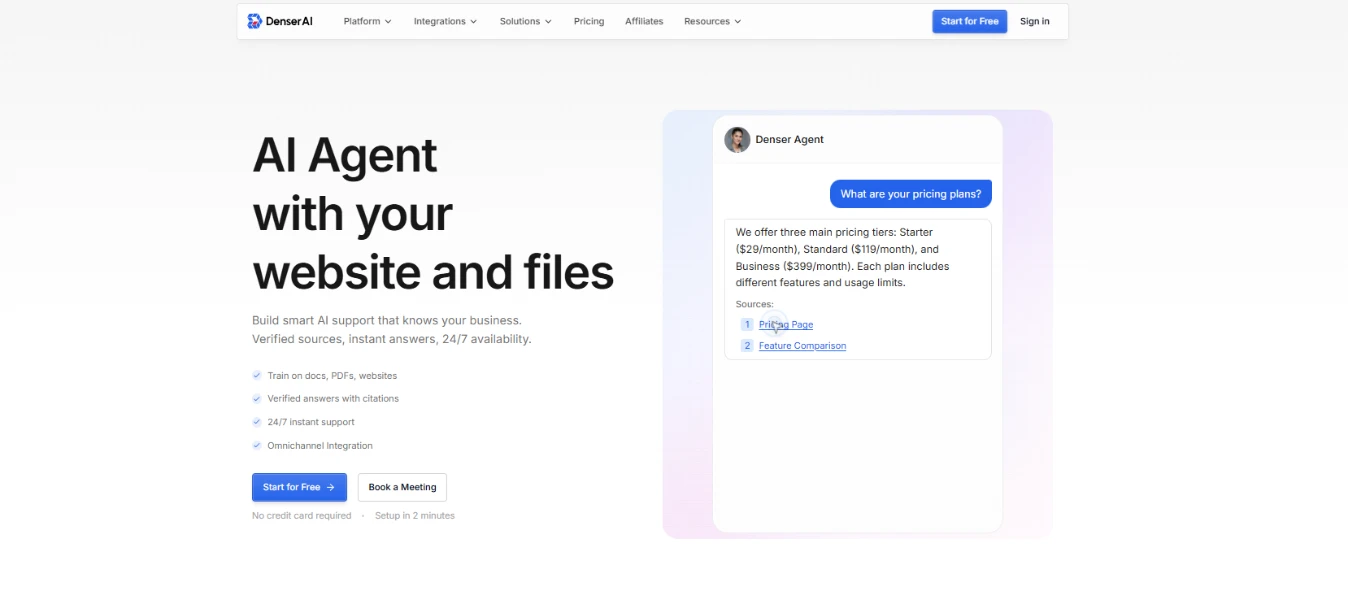
With 24/7 instant support, it ensures your customers always get accurate answers and post-purchase support, even outside business hours.
Denser’s features are tailored for ecommerce success. It learns from every interaction and continuously adapts to provide smarter, more contextual responses over time.
The platform can seamlessly integrate with your existing business tools and sales channels. You can connect it to Shopify using our Shopify chatbot solution, CRMs, or inventory systems to pull real-time product data and update product descriptions.
Denser also supports over 80 languages to engage shoppers in their preferred language worldwide. The chatbot can follow up on abandoned carts or offer promotions that encourage repeat purchases and higher order values.
Sign up for a free trial or schedule a demo with Denser today!
2. Intercom#
Intercom is a customer communication platform now improved with AI functionality. Its AI agent, Fin, demonstrates how AI agents work by resolving a large volume of support inquiries by pulling from your existing help center content.
Intercom bridges support and conversion by suggesting upsells or discounts when a user seems hesitant at checkout. It also detects high-intent behaviors and can recommend products or provide incentives, which contribute to complex decisions during the purchase journey.
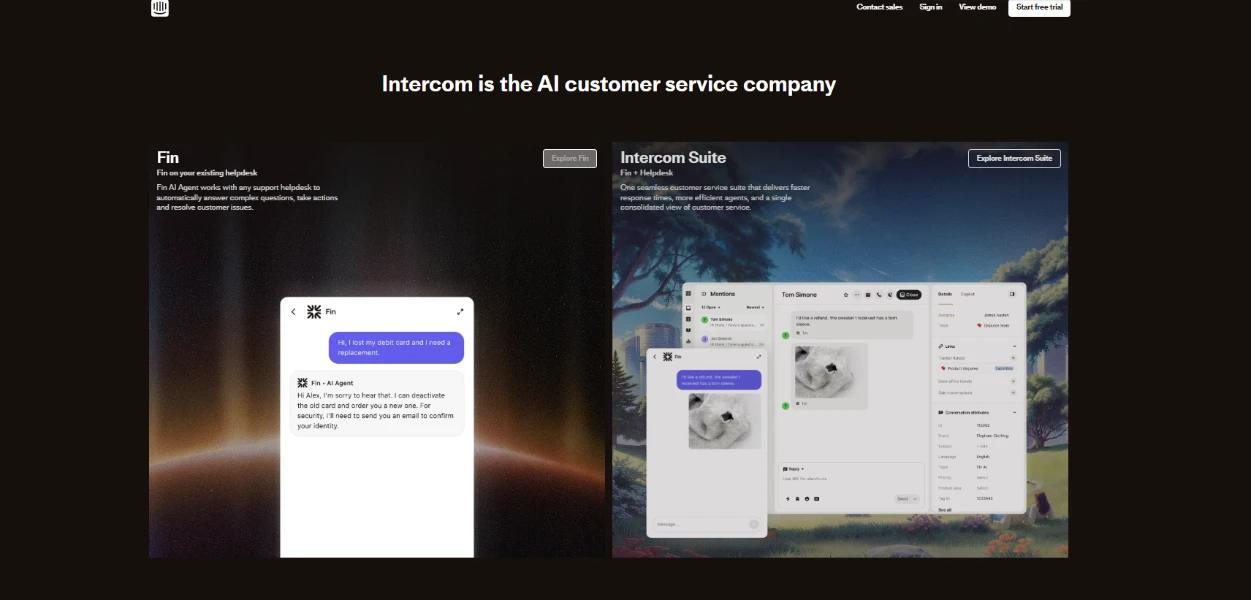
Image Source: intercom.com
Intercom integrates with your ecommerce tech stack to perform actions like applying promo codes or checking loyalty points in the chat. It provides a unified inbox for all channels, which your team can use alongside the AI.
When it comes to limitations, many small and mid-sized companies find Intercom’s pricing to be relatively high and not flexible as they grow. Advanced features like certain automation or reporting tools may cost extra, which can be challenging for startups on a tight budget.
3. Sendbird#
Sendbird is an omnichannel customer engagement platform that allows you to add AI-powered chat to your website or mobile app. It specializes in connecting with customers on channels like web chat, in-app messaging, SMS, email, WhatsApp, or social media through one unified API.
Sendbird’s AI agent uses complex problem-solving to distinguish between routine and advanced requests, then routes nuanced cases to human agents with full conversation context intact.
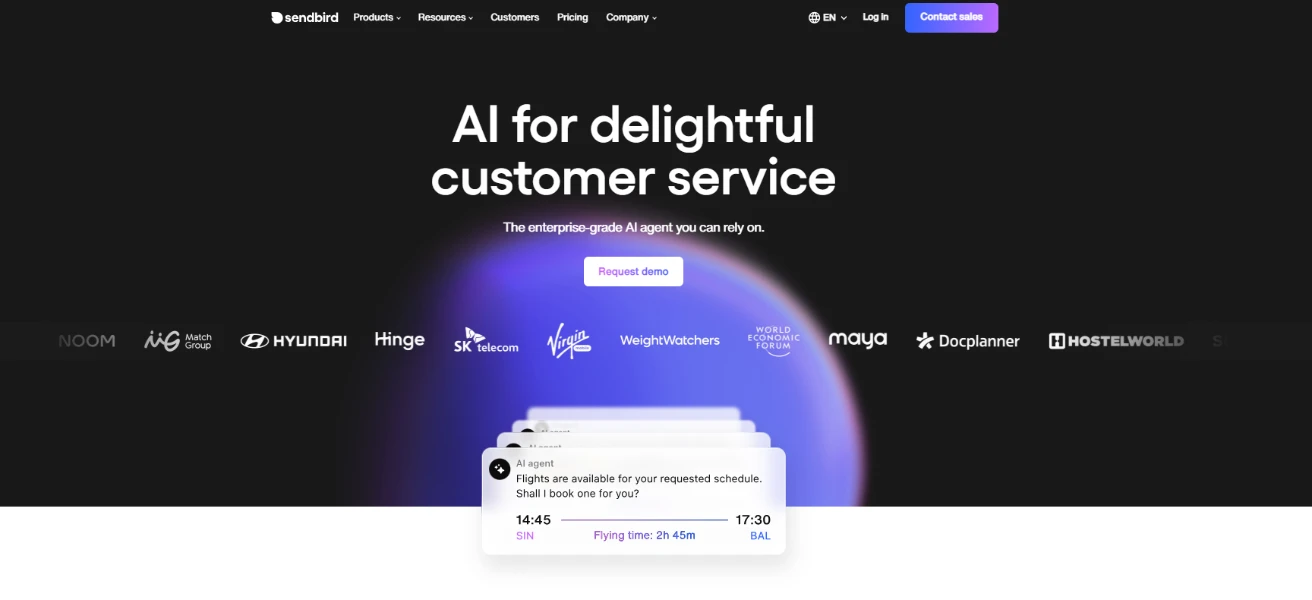
Image Source: sendbird.com
The platform is developer-friendly, and you can integrate it with your backend databases and systems to pull in customer order history, loyalty status, or inventory details into the chat.
However, some businesses have experienced a steep learning curve when first implementing Sendbird’s AI, especially if their team is new to setting up chatbots and omnichannel flows.
Tuning the AI and integrating all your channels can take time and careful configuration. The advanced capabilities and white-glove support come at a premium cost.
4. Kustomer#
Kustomer is a customer service CRM platform that combines ticketing, customer data, and AI agents. It provides an AI concierge that can autonomously resolve a large volume of routine requests.
The platform's AI agents are designed to deflect queries and solve them end-to-end with human-like accuracy. It can also deploy multiple specialized AI agents as a team. You can have one bot focused on order tracking, another on product advice, and another on account issues.
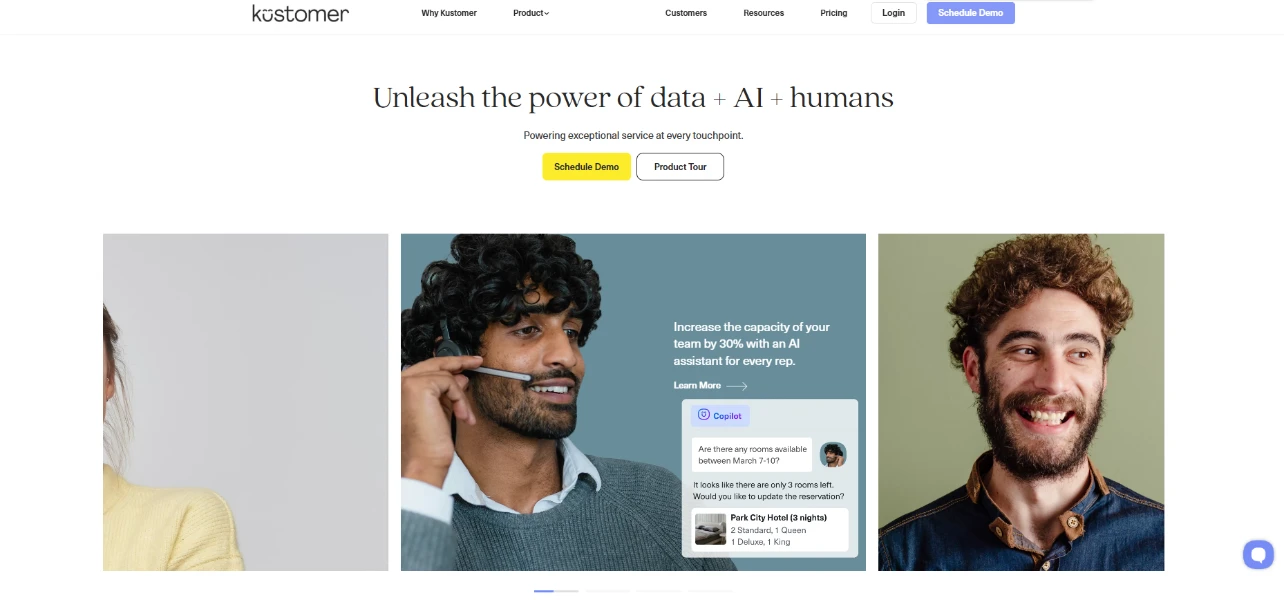
Image Source: kustomer.com
Voice is natively integrated, where you can have an AI voice agent answering phone calls to handle simple requests via speech. It also has an AI Agent Studio that lets you build or tweak your bots with a no-code interface for customizing conversation flows and integrations.
Some users note that the platform is complex to customize and has a lot of depth, which means onboarding your team isn’t instant. You may need to spend time configuring workflows and educating agents on the interface.
Certain interface elements also have room for improvement, as per the user. The conversation UI isn’t very intuitive when scrolling through long threads, and only three status options for tickets can feel limiting.
5. Ada#
Ada is an AI-native customer service automation platform adopted for ecommerce support. Shoppers get 24/7 assistance through a conversational interface on your site or app, and Ada can escalate to email or live chat with an agent if needed.
It also provides a visual “answer flow” builder where you can design conversations and guide customers through multi-step tasks with clicks.
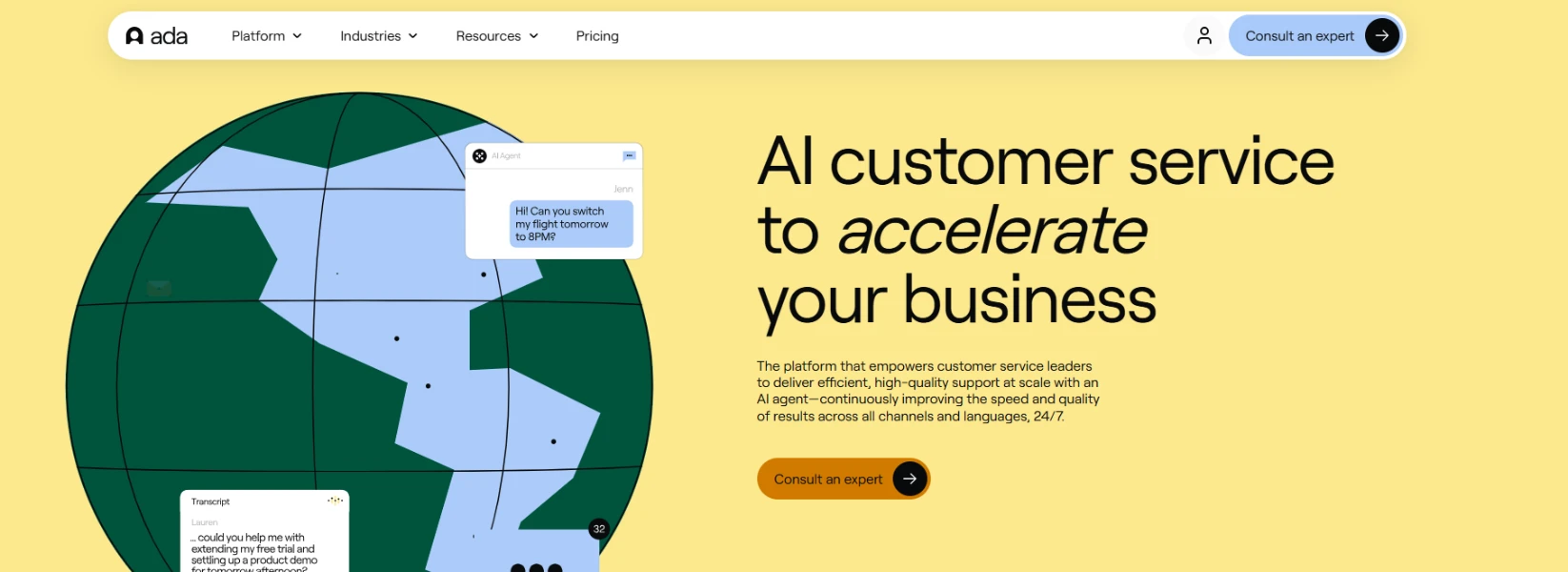
Image Source: ada.cx
However, there are instances where the chatbot may misinterpret a query or give an irrelevant answer if it falls outside its training. Another commonly cited drawback is that Ada’s analytics and reporting can be a bit confusing or complicated to trust.
Some reviewers mention that the dashboard numbers don’t always match what they observe in actual conversations, which makes it tricky to measure the bot’s performance.
Use Cases of AI Agents in Ecommerce#
AI technology can serve many functions in ecommerce businesses. Below are the main areas where intelligent agents make a major difference.
Customer Service Chatbots#
One of the most common uses of AI-powered systems is to handle customer service interactions on websites or mobile apps.
Customer service chatbots can resolve post-sale support questions or answer FAQs related to returns, shipping, and store policies.
A well-trained chatbot can resolve issues like order tracking or product availability instantly, without waiting for a human agent. This improves satisfaction and reduces support workload by offering real-time assistance.
Businesses now use conversational AI chatbots for customer support, and bots can respond to inquiries faster than human agents.
Amazon, one of the world’s largest ecommerce platforms, uses an AI-powered chatbot called Rufus AI across its website and mobile app to assist customers with routine inquiries.
It helps users track orders and find answers to product-related questions without waiting for a human representative.
Virtual Shopping Assistants#
Intelligent website virtual assistants act like personal shoppers for your customers. They engage users in a dialogue to discover their customer preferences and then recommend suitable products.
They might ask a website visitor questions about their style, needs, or budget and then suggest tailored recommendations. They can also upsell or cross-sell by recommending complementary items.
Levi’s created a Virtual Stylist chatbot that asks customers about fit and style preferences and provides personalized support, such as jeans and size suggestions.
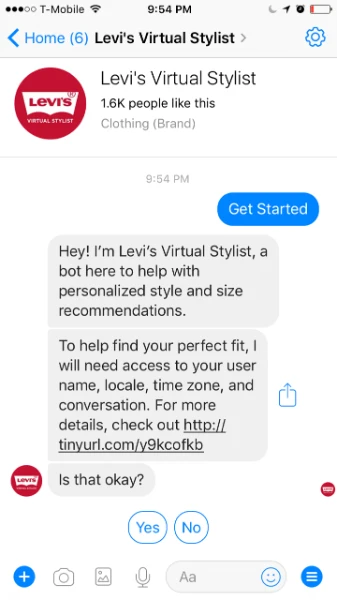
Image Source: levistrauss.com
Such AI shopping agents help users find the “perfect” product more easily, which can enhance customer experiences and drive higher average order values.
Product Recommendation Engines#
While not chat-based, these AI agents personalize the shopping experience. A recommendation engine analyzes browsing history, purchase history, and product data to suggest items a customer is likely to buy.
You’ve seen this on online shopping platforms as “You may also like” or “Customers who viewed this also viewed…”. These AI-driven suggestions often use customer behavior patterns to recommend relevant products.
Netflix uses an AI recommendation engine that analyzes your viewing habits and ratings to suggest content. Similarly, ecommerce platforms can offer personalized promotions based on shopping habits and interactions.
Inventory and Supply Chain Agents#
AI isn’t only customer-facing but also optimizes operational tasks. These tools enhance operational efficiency by forecasting demand, maintaining optimal stock levels, and placing automatic restock orders.
Inventory management agents use AI to automate routine tasks like checking availability and updating the product catalog. They analyze market trends, seasonality, and even environmental factors to maintain flow.
Dynamic pricing algorithms compare competitor pricing and demand in real time, which allows AI systems to make informed decisions about when to increase or decrease product prices.
Large retailers already use such AI for pricing and supply chain, but even mid-sized businesses can use these tools via software platforms.
An AI agent for inventory might alert you, “Product X is likely to run out in 3 days, consider reordering,” or automatically place an order if configured to do so.
Fraud Detection and Security Agents#
Ecommerce businesses face risks like fraudulent transactions, fake reviews, or account takeovers. AI is used in fintech for fraud detection, real-time activity monitoring, and flagging anomalies that suggest fraud.
They use historical patterns and predictive algorithms to identify signs of abuse. For example, detecting excessive purchases from one IP or recognizing irregularities in checkout behavior can flag a complex problem in progress.
eBay uses AI-driven fraud detection tools to protect its marketplace from fraudulent listings, account abuse, and unauthorized transactions. Its AI systems automatically flag and remove suspicious activity, often before it affects other users.
Your business can also incorporate AI agents that cancel risky orders or detect fake reviews and bot-driven abuse by learning from historical patterns of normal user behavior.
How AI Agents Add Value to Ecommerce Operations#
Implementing AI agents can provide multiple advantages for e-commerce businesses. Below are some of the key benefits you can anticipate:
Improved Customer Service and Engagement#
AI chatbots make sure your customers get instant responses and help at any time, which improves the service experience. Quick, helpful answers reduce frustration and increase customer engagement on your site.
Notably, 90% of businesses registered faster complaint resolution after implementing chatbots. AI agents keep customers satisfied and more likely to buy from you again by being available 24/7.
Higher Conversion Rates and Sales#
A well-deployed AI agent can drive sales by guiding shoppers, giving personalized recommendations, or providing timely assistance during checkout.
Shoppers who engage with an AI chat assistant are far more likely to make a purchase. Additionally, upselling through recommendations, such as “frequently bought together” prompts, can increase order values.
Personalized Shopping Experiences#
From the moment users arrive on your digital storefront, they are met with contextual suggestions and relevant promotions.
AI agents can greet users by name, remember their preferences, and show relevant content or products. Personal touch replicates the feel of a boutique shop but is automated across millions of users.
Personalized experiences make customers feel valued and understood, which builds loyalty. Returning customers who use AI-driven chat tend to spend more.
Cost Savings and Efficiency#
AI agents can handle a large volume of routine tasks, which lowers your operational costs.
Because these agents can operate independently, there's less need for large support teams answering the same questions. They also reduce human intervention in processes like order verification or shipment tracking.
Businesses have found that chatbots cut operational costs.) by resolving common issues, leading to huge savings in customer service labor. AI automation in inventory or order processing also minimizes manual errors and speeds up workflows.
Scalability for Peak Demand#
If your ecommerce business faces seasonal peaks or sudden traffic spikes, AI agents help you scale operations. They’re built to handle high volumes of traffic without compromising performance.
A well-trained FAQ chatbot can simultaneously support thousands of customers during a holiday rush. These systems often integrate with your CRM or helpdesk to ensure data stays consistent and actionable across platforms.
Actionable Data Insights#
Customer service AI tools record every interaction, which makes it easy to review what worked and what didn’t. This data uncovers behavioral patterns, unmet needs, and recurring concerns, which support better decision-making.
With time, AI systems help analyze market trends based on real queries and purchases. When combined with generative AI models, these tools can even suggest new product ideas or improvements based on customer demand.
Cut Response Times, Boost Conversions Powered by AI—Choose Denser!#
If your business is struggling with slow response times or missed sales opportunities, Denser is the solution you need. Customers expect instant, intelligent help, and it gives you the power to meet those expectations with an AI chatbot that’s always available and learning.
Built with advanced AI and natural language processing, Denser holds smart, contextual conversations that guide shoppers toward purchase decisions.
It qualifies leads in real time, handles product and order inquiries, and integrates with your CRM and ecommerce tools for seamless operations.
Even better, it supports multiple languages, runs 24/7, and delivers deep insights on every interaction, so you’re never in the dark about what your customers want.
From simplifying customer support to increasing conversions, Denser is the ecommerce AI agent built to grow with your business. If you’re starting or managing thousands of customer interactions a day, it scales to meet your needs.
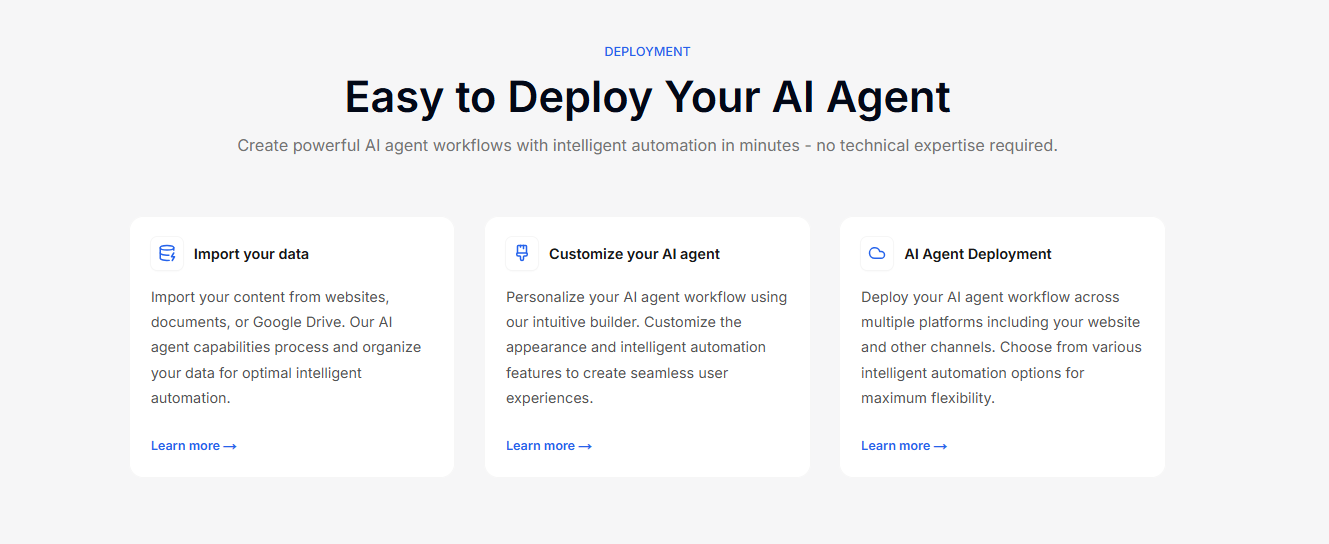
Don’t let manual processes slow down your store. Make Denser your front-line solution for smarter, faster, and more profitable customer engagement. Sign up for a free trial or schedule a demo today!
FAQs About Ecommerce AI Agents#
Can AI agents integrate with my ecommerce platform?#
Yes. Most ecommerce AI tools are designed to integrate with platforms like Shopify, WooCommerce, Magento, BigCommerce, and others.
Integration allows the AI agent to access product data, customer profiles, and order history to deliver personalized service and automate specific tasks like returns and restocking.
Are AI agents expensive to implement?#
Not necessarily. Platforms like Denser offer fast, no-code chatbot deployment at scalable pricing based on your business size.
While some enterprise-level tools come with higher costs, many AI solutions are accessible to small and mid-sized businesses and deliver strong ROI through automation, efficiency, and reduced ongoing maintenance needs.
What tasks can ecommerce AI agents automate?#
They can automate customer service (FAQs, order tracking, returns), marketing (personalized recommendations, follow-ups), sales support (cart recovery, product suggestions), and operations (inventory forecasting, fraud detection).
In this new era, AI agents are not just reactive but proactive. It anticipates customer needs and even contributes to logistics strategies, including self-driving car integrations in fulfillment.
This level of innovation is truly making waves in how you connect with your customers and expand operations.